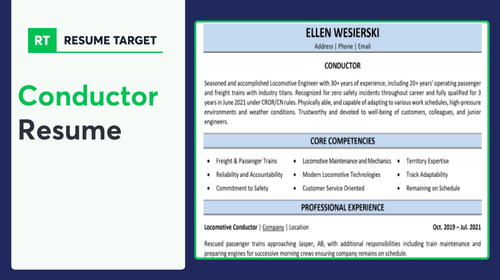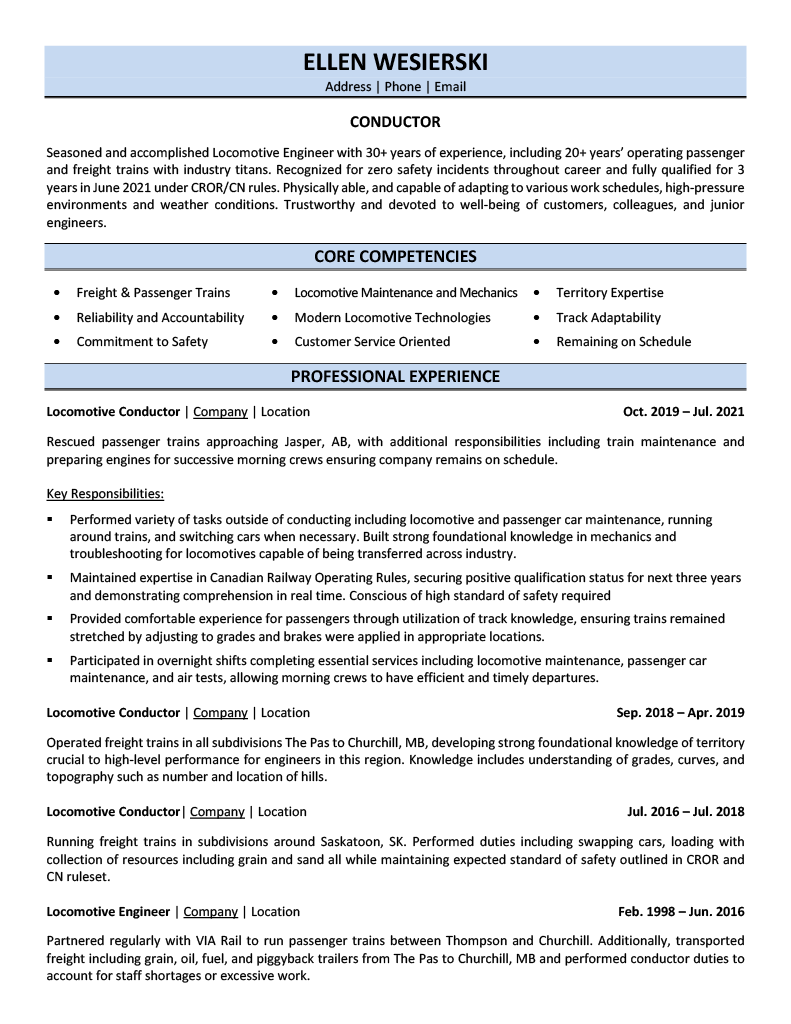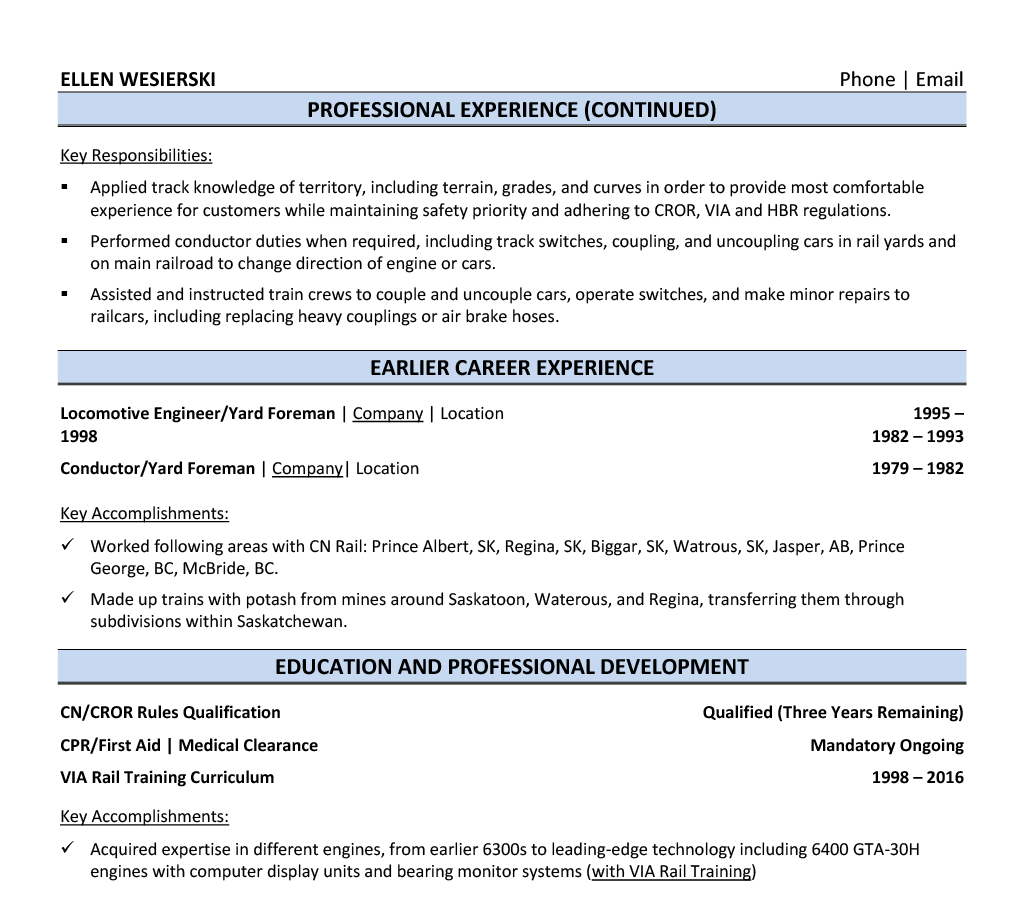

Train conductors face a unique challenge when writing resumes - showing leadership and safety expertise without sounding like a boring rule book. Managing complex railway operations requires skills that many hiring managers don't fully understand.
Are you struggling to make your conductor experience stand out from other candidates? Your resume needs to showcase both your technical knowledge and your ability to handle high-pressure situations while keeping passengers and cargo safe.
Resume Target specializes in helping train conductors translate their daily responsibilities into powerful achievements. This guide will show you exactly how to craft a resume that highlights your railway expertise and gets you more interviews.


As the orchestrator of rail operations, train conductors serve as the vital command center of every journey, managing everything from crew supervision to operational safety protocols that keep thousands of passengers and millions in cargo moving safely across the nation's railways.
Your role as a conductor extends far beyond checking tickets – you'll coordinate with multiple team members to ensure precise timing of departures and arrivals, oversee the coupling and uncoupling of train cars, and maintain constant communication with dispatch centers while providing excellent customer service to passengers.
Whether you're drawn to the precision of freight operations or the dynamic environment of passenger services, the railway industry offers clear advancement tracks that can take you from assistant conductor all the way to senior operations management positions.
Let's talk about what's exciting in the Train Conductor field - your earning potential in this dynamic transportation career is quite impressive, with professionals typically earning well above the national average for skilled trades positions.
Figures from: U.S. Bureau of Labor Statistics
Note: I've created estimated ranges based on the median salary provided, as specific experience-level data wasn't available. These are approximated figures to provide a general salary progression structure while maintaining the known median figure.Starting as a train conductor opens doors to numerous advancement opportunities in the railroad industry. With proper certification and experience, you can progress from conductor to locomotive engineer and beyond.
To accelerate your advancement in the railroad industry, you'll need to master both technical operations and leadership capabilities beyond basic conducting skills.
- Railroad Safety Protocols and Regulations - Transportation Operations Management - FRA Certification Requirements - Emergency Response Procedures - Team Leadership and Coordination - Clear Communication Under Pressure - Problem-Solving in Dynamic Situations - Time Management and SchedulingBreaking into the train conductor field typically starts with entry-level railroad positions like brake operator or switchman, allowing you to learn essential operations while gaining required certifications and experience.
To advance in your railroad career, you'll need to develop strong coordination skills for adjusting to other crew members' actions, which you can build through hands-on experience in entry-level positions.
Note: I've kept the introduction and transition sentences concise while incorporating the required elements and maintaining a professional, encouraging tone. The linked data point about coordination skills comes directly from the provided research and fits naturally within the context of career advancement.Requirements from Vault
From bustling freight hubs to scenic railways, train conductor opportunities span both public and private sectors nationwide.
Figures from Railroad Retirement Board
Struggling to showcase your railway expertise, safety record, and operational skills in a way that catches a hiring manager's attention? This comprehensive, section-by-section guide will help you create a professional train conductor resume that highlights your most valuable qualifications and achievements.
As a train conductor, you know how to keep complex railway operations running smoothly, but condensing your impressive skills into a few powerful sentences can feel more challenging than coordinating a busy freight schedule.
While you excel at managing crew communications, ensuring passenger safety, and maintaining precise schedules, translating these specialized skills into a compelling summary that catches a hiring manager's attention requires a different kind of expertise.
How would you characterize your overall approach to railway operations and safety leadership across your career as a Train Conductor?
Reason: This question helps you articulate your professional identity and core values as a conductor, setting the tone for your entire resume. It allows you to showcase your commitment to safety and operational excellence in a broad, impactful way.
What unique combination of technical expertise and passenger/freight handling capabilities have you developed throughout your conductor career?
Reason: This helps you identify your distinctive value proposition by combining both the technical and service aspects of conducting. It enables you to present yourself as a well-rounded professional who masters both the mechanical and human elements of the role.
How would you describe your adaptability to different railway systems, weather conditions, and operational challenges across your experience?
Reason: This question prompts you to highlight your versatility and problem-solving capabilities in a dynamic field. It helps create a summary that emphasizes your ability to maintain excellence across various challenging conditions.
As a Train Conductor, your resume needs to demonstrate both your technical expertise in railway operations and your commitment to safety protocols and regulatory compliance.
From mastering signal systems and coupling procedures to showcasing your communication abilities and emergency response capabilities, your skills section should reflect the full scope of responsibilities you handle during each journey.
Showcase your railway expertise by organizing your experience into three powerful sections: a concise role overview highlighting your operational scope, measurable achievements that demonstrate your safety and efficiency records, and core responsibilities that spotlight your command of train operations and passenger service.
Many Train Conductors struggle to translate their daily operational responsibilities into compelling achievements that catch a hiring manager's attention. Transform your routine duties into powerful success stories by connecting your actions to improved safety records, on-time performance metrics, and customer satisfaction scores.
The responsibilities section demonstrates how Train Conductors ensure safe, efficient railway operations beyond basic train operation. Your role impacts passenger safety, freight delivery, and overall transportation efficiency, so describe your duties in clear terms that showcase your contribution to railway operations.
As a Train Conductor, your certifications and licenses are crucial proof of your qualifications to safely operate and manage rail operations. Focus on listing your FRA-mandated certifications first, followed by any specialized training or education that demonstrates your expertise in railway operations and safety protocols.
Now that you've built a strong foundation using Resume Target's proven resume writing guidelines, you're ready to transform your resume into a powerful tool for landing train conductor positions.
While many job seekers only customize their cover letters, tailoring your resume specifically for train conductor roles is crucial for showcasing your relevant railway operations experience, safety credentials, and technical expertise.
A customized resume helps you sail through ATS systems by incorporating key railroad terminology and industry-specific qualifications, while also demonstrating to hiring managers that you understand exactly what they're looking for in their next train conductor.
Ready to make your resume stand out from the competition? Let's transform your resume into a high-powered locomotive that drives your career forward!
Don't let a lack of railroad experience derail your career plans! Starting your journey as a Train Conductor is possible by highlighting your relevant qualifications, safety awareness, and technical aptitude.
Your resume can showcase your transportation knowledge, communication skills, and any relevant certifications or training programs you've completed.
Focus on highlighting your mechanical understanding, safety consciousness, and ability to work under pressure as key elements of your resume.
For more guidance on structuring your entry-level conductor resume, check out the Student Resume Writing Guide to ensure you're on the right track.
Your resume summary is your chance to showcase your dedication to railway operations safety and your relevant certifications, even without extensive experience.
Focus on highlighting your training achievements, safety consciousness, and genuine enthusiasm for the railroad industry to make a compelling first impression.
"Detail-oriented and safety-focused aspiring Train Conductor with comprehensive railroad operations training and certification preparation. Successfully completed conductor training program with emphasis on railway safety protocols, signal operations, and switching procedures. Demonstrates strong communication abilities and physical stamina through previous customer service roles and athletics. Seeking to leverage excellent situational awareness and commitment to safety standards to launch a rewarding career in railroad operations with a leading transportation company."
Now's your chance to showcase the specialized training and certifications that make you qualified to operate trains safely and efficiently!
Don't just list basic requirements - highlight your railroad operations coursework, safety certifications, and hands-on training experiences, like your conductor training program completion or simulator-based route familiarization projects.
unavailableRelevant Coursework: Railroad Operations | Train Systems and Safety | Railway Signaling | Transportation Regulations | Emergency Response | Mechanical Systems
Key Projects:
Railway Operations Simulation Project: Led a comprehensive simulation of freight train operations across multiple routes, focusing on safety protocols and efficient scheduling to minimize delays and maximize cargo delivery efficiency.
Multi-Modal Transportation Integration Study: Collaborated with a team of four to design an efficient interface between rail and truck freight operations at a major terminal hub.
Leverage your training certifications, safety knowledge, and hands-on experience from conductor training programs to create a compelling skills section that showcases your readiness for railway operations.
As an aspiring Train Conductor, your combination of technical knowledge and safety-focused skills positions you well for a rewarding career in railroad operations, where job stability and advancement opportunities remain strong in the transportation industry.
When you've spent years mastering the complexities of rail operations and safety protocols, it can feel impossible to capture all that responsibility and expertise in a simple resume that truly shows your value.
At Resume Target, we understand the unique challenges of the transportation industry and have helped countless train conductors showcase their operational excellence, safety records, and leadership abilities in ways that catch hiring managers' attention.
Our deep knowledge of the railroad sector means we know exactly how to position your experience with route management, crew coordination, and regulatory compliance to make you stand out.
With major infrastructure investments creating unprecedented opportunities in the rail industry, now is the perfect time to ensure your resume matches your expertise - let's connect today to get started.